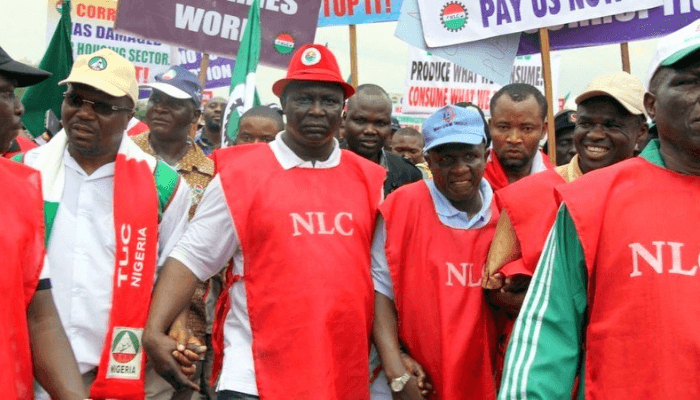The Federal Government of Nigeria recently held a meeting with organized labour regarding post-subsidy removal palliatives for workers.
This meeting, which took place in Abuja and was hosted by the Minister of Labour, Simon Lalong, aimed to address the demands of the Nigerian Labour Congress (NLC) and prevent a planned indefinite strike that could have a significant impact on the economy.
[caption id="attachment_10878" align="alignnone" width="700"]

FG, NLCmeet to avoid workers' indefinite strike. Photo: Business Day[/caption]
However, it did not result in a consensus, as the NLC insisted that the government must meet its demands before the 21-day ultimatum issued on September 1 by the NLC.
The NLC had given the ultimatum due to delays in sharing palliatives and warned of an indefinite labour action if its demands were not met.
To press their demands further, the NLC organized a two-day warning strike on September 5 and 6, which partially disrupted social and economic activities in various states, with banks, ministries, agencies, and departments closed in some areas.
The key demands of the NLC and the Trade Union Congress (TUC) include wage awards, implementation of palliatives, tax exemptions, and allowances for public sector workers, as well as a review of the minimum wage.
Although the Federal Government committed to restructuring the framework for engagement with organized labour on palliatives, the eight-week timeframe set for the conclusion of the process had expired in August without any concrete action being taken,
Guardian reports.
At the end of the meeting, both parties pledged to work towards finding solutions to the demands presented by the organized labour before the deadline.
Minister Simon Lalong mentioned that many of the items presented by labour were still under consideration before reaching a final agreement.
President of the NLC, Joe Ajaero, also described the meeting as fruitful but emphasized that decisions on the demands presented would ultimately be made by the Presidency.
He expressed the readiness of the organized labour to meet with the government at any time to resolve their issues and avoid the planned strike.
The situation reflects ongoing negotiations and tensions between the Nigerian government and organized labour, with the possibility of further developments in the near future as both parties work to reach an agreement on the labour demands.
 FG, NLCmeet to avoid workers' indefinite strike. Photo: Business Day[/caption]
However, it did not result in a consensus, as the NLC insisted that the government must meet its demands before the 21-day ultimatum issued on September 1 by the NLC.
The NLC had given the ultimatum due to delays in sharing palliatives and warned of an indefinite labour action if its demands were not met.
To press their demands further, the NLC organized a two-day warning strike on September 5 and 6, which partially disrupted social and economic activities in various states, with banks, ministries, agencies, and departments closed in some areas.
The key demands of the NLC and the Trade Union Congress (TUC) include wage awards, implementation of palliatives, tax exemptions, and allowances for public sector workers, as well as a review of the minimum wage.
Although the Federal Government committed to restructuring the framework for engagement with organized labour on palliatives, the eight-week timeframe set for the conclusion of the process had expired in August without any concrete action being taken, Guardian reports.
At the end of the meeting, both parties pledged to work towards finding solutions to the demands presented by the organized labour before the deadline.
Minister Simon Lalong mentioned that many of the items presented by labour were still under consideration before reaching a final agreement.
President of the NLC, Joe Ajaero, also described the meeting as fruitful but emphasized that decisions on the demands presented would ultimately be made by the Presidency.
He expressed the readiness of the organized labour to meet with the government at any time to resolve their issues and avoid the planned strike.
The situation reflects ongoing negotiations and tensions between the Nigerian government and organized labour, with the possibility of further developments in the near future as both parties work to reach an agreement on the labour demands.
FG, NLCmeet to avoid workers' indefinite strike. Photo: Business Day[/caption]
However, it did not result in a consensus, as the NLC insisted that the government must meet its demands before the 21-day ultimatum issued on September 1 by the NLC.
The NLC had given the ultimatum due to delays in sharing palliatives and warned of an indefinite labour action if its demands were not met.
To press their demands further, the NLC organized a two-day warning strike on September 5 and 6, which partially disrupted social and economic activities in various states, with banks, ministries, agencies, and departments closed in some areas.
The key demands of the NLC and the Trade Union Congress (TUC) include wage awards, implementation of palliatives, tax exemptions, and allowances for public sector workers, as well as a review of the minimum wage.
Although the Federal Government committed to restructuring the framework for engagement with organized labour on palliatives, the eight-week timeframe set for the conclusion of the process had expired in August without any concrete action being taken, Guardian reports.
At the end of the meeting, both parties pledged to work towards finding solutions to the demands presented by the organized labour before the deadline.
Minister Simon Lalong mentioned that many of the items presented by labour were still under consideration before reaching a final agreement.
President of the NLC, Joe Ajaero, also described the meeting as fruitful but emphasized that decisions on the demands presented would ultimately be made by the Presidency.
He expressed the readiness of the organized labour to meet with the government at any time to resolve their issues and avoid the planned strike.
The situation reflects ongoing negotiations and tensions between the Nigerian government and organized labour, with the possibility of further developments in the near future as both parties work to reach an agreement on the labour demands.




















